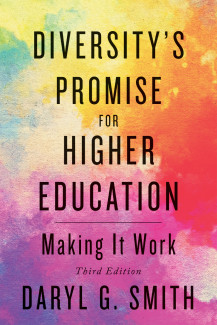
Johns Hopkins UniversityEst. 1876
America’s First Research University
Now Browsing:
Diversity’s Promise for Higher Education: Making It Work, Third Edition

The third edition of Diversity’s Promise for Higher Education: Making It Work was already in press prior to the pandemic and, subsequently, the assault on the Capitol. While the book presaged these events, its core message remains relevant. The pandemic has exposed and laid bare inequities across health care and education. The white supremacist assault on the Capitol highlighted, once again, the critical need for justice and racial reckoning. This book makes clear that every institution in the country must come to terms with the fragility of democracy, the imperative of diversity, and the urgency of change. Reframing our ways of thinking about diversity from an institutional perspective provides opportunities to confront the unfinished business of the past even as we address the issues of today.
Decades ago, our institutions intentionally developed capacity for technology. Technology was understood to be an imperative because of societal changes. Given that the role of American Higher Education is central to preparing leaders for a pluralistic society, academic excellence requires that our colleges and universities understand how diversity, like technology, is tied to excellence, making it imperative that institutions increase capacity for diversity. Creating healthy pluralistic democracies requires, at a minimum, an intentional focus on the role and complexity of identities and, most certainly, the recognition of historically embedded societal inequities.

Leaders from all industries are now having to address disparities in their institutions, but too often their response to revelations of bias and inequality is “I didn’t know.” But why did our leaders – the graduates of our institutions – not know? The content of scholarship and curriculum must prepare our leaders to identify and understand the conditions that create environments that are equitable for all. These days, diversity and equity are often considered part of an institution’s strategic plan for inclusiveness, and essential values that are parallel with other core issues. Diversity’s Promise suggests that in addition to being a value in and of itself, it must be manifest as an imperative for change in structures, systems, and metrics for excellence. This is as true for access, success, and campus climate, as it is for the content of scholarship, the curriculum, and the skills required to help future leaders and scholars confront and engage those inequities so deeply embedded that they restrict knowledge and the development and, importantly, the identification of talent.
Due to the confluence of recent events, we are in a moment that provides opportunities for real change, opportunities to create organizations where creativity and innovation thrive. It has never been more imperative that we interrupt the usual by recognizing the inextricable indivisibility of diversity and excellence. In so doing, we will equip American Higher Education with the tools essential to fulfilling its critical imperative for a healthy democracy that works.
Order the third edition of Diversity’s Promise for Higher Education: Making It Work at the following link: https://jhupbooks.press.jhu.edu/title/diversitys-promise-higher-education
Daryl G. Smith is Senior Research Fellow and Professor Emerita of Education and Psychology at Claremont Graduate University. Among other published work, she is an author or co-author of Diversity’s Promise for Higher Education: Making It Work, Diversity in Higher Education: Emerging Cross-national Perspectives on Institutional Transformation, Building Institutional Capacity for Diversity and Inclusion in Academic Medicine, Achieving Faculty Diversity: Debunking The Myths, Interrupting The Usual: Successful Strategies for Hiring Diverse Faculty, Organizational Learning a Tool for Diversity and Institutional Effectiveness.

Decades ago, our institutions intentionally developed capacity for technology. Technology was understood to be an imperative because of societal changes. Given that the role of American Higher Education is central to preparing leaders for a pluralistic society, academic excellence requires that our colleges and universities understand how diversity, like technology, is tied to excellence, making it imperative that institutions increase capacity for diversity. Creating healthy pluralistic democracies requires, at a minimum, an intentional focus on the role and complexity of identities and, most certainly, the recognition of historically embedded societal inequities.

Leaders from all industries are now having to address disparities in their institutions, but too often their response to revelations of bias and inequality is “I didn’t know.” But why did our leaders – the graduates of our institutions – not know? The content of scholarship and curriculum must prepare our leaders to identify and understand the conditions that create environments that are equitable for all. These days, diversity and equity are often considered part of an institution’s strategic plan for inclusiveness, and essential values that are parallel with other core issues. Diversity’s Promise suggests that in addition to being a value in and of itself, it must be manifest as an imperative for change in structures, systems, and metrics for excellence. This is as true for access, success, and campus climate, as it is for the content of scholarship, the curriculum, and the skills required to help future leaders and scholars confront and engage those inequities so deeply embedded that they restrict knowledge and the development and, importantly, the identification of talent.
Due to the confluence of recent events, we are in a moment that provides opportunities for real change, opportunities to create organizations where creativity and innovation thrive. It has never been more imperative that we interrupt the usual by recognizing the inextricable indivisibility of diversity and excellence. In so doing, we will equip American Higher Education with the tools essential to fulfilling its critical imperative for a healthy democracy that works.
Order the third edition of Diversity’s Promise for Higher Education: Making It Work at the following link: https://jhupbooks.press.jhu.edu/title/diversitys-promise-higher-education
Daryl G. Smith is Senior Research Fellow and Professor Emerita of Education and Psychology at Claremont Graduate University. Among other published work, she is an author or co-author of Diversity’s Promise for Higher Education: Making It Work, Diversity in Higher Education: Emerging Cross-national Perspectives on Institutional Transformation, Building Institutional Capacity for Diversity and Inclusion in Academic Medicine, Achieving Faculty Diversity: Debunking The Myths, Interrupting The Usual: Successful Strategies for Hiring Diverse Faculty, Organizational Learning a Tool for Diversity and Institutional Effectiveness.

Login to View & Leave Comments
Login to View & Leave Comments


